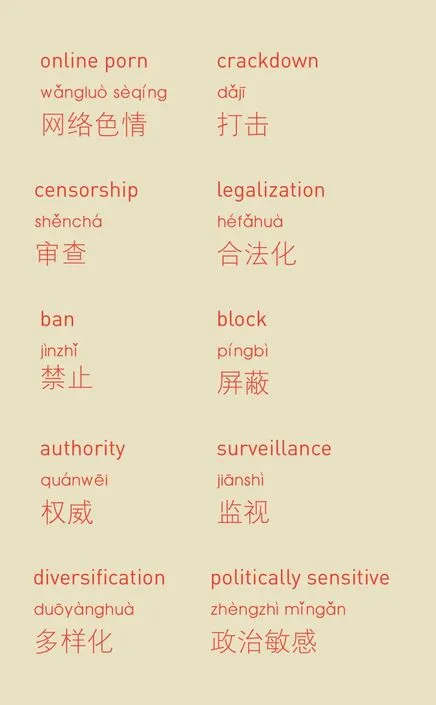CHINAPORNWARS.COM
2013-08-07BYTYLERRONEY
BY TYLER RONEY
CHINAPORNWARS.COM
BY TYLER RONEY
大战网络色情
The shady online world of the Middle Kingdom’s kink
Twitter and Facebook? Banned, no problem. Amnesty International andThe New York Times? Completely blocked. Youtube and Wordpress? Easy-peasy-lemonsqueezy.
Porn.com and Big Butts Like it Big? Not so much. Yes, China is famous for blocking, banning, and condemning any website that offends the nation’s delicate sensibilities, but pornography—perhaps the one thing that could have a consensus for blanket censorship—always seems to conspicuously slipthrough regardless of crackdowns and threats from the highest authorities. First, it must be said that China blocks a lot of pornography and has since New China was founded. But have the great people of the Middle Kingdom gone without their fix since 1949? Hell no. Pornography has always found a way in China, and online pornography is just the latest in a long line of failures for the censors.
Like it or not, this strange aspect of modern Chinese culture does not seem to be going away; the sheer scale of pornography on the world wide web is staggering, even for China’s busy censors. Often used for as a smokescreen for more—shall we say—political endeavors, online pornography has been used as a weapon on everyone from Apple to Ai Weiwei, all while some of the most popular pornography sites on the net remain unscathed. Couple all this with the famous whimsy of China’s censors and the situation becomes a decidedly strange and capricious war on an internet staple.
One of China’s early 2013 crackdowns on porn shut down 225 websites, 4,000 web channels, and 30,000 blogs; also, between March and May 2013, Chinese authorities seized 180,000 online publications, bragging of closing down 5.6 million illegal publications in all. Nevertheless, online porn still persists and thrives.
The big bosses in charge of said censoring are the National Office Against Pornographic and Illegal Publications, but the real warriors are those on the ground, the “Chief Pornography Identification Officers”(首席鉴黄师 shǒuxí jiànhuángshī). Hunan provincial television interviewed a 70-year-old porn censor named Liu Xiaozhen earlier this year; the requirements for the job seemed to require training and simply being married.But, even though “anti-pornography” is the official government line, it can be a dangerous position to take. Some anti-pornography advocates have even received death threats. Such was the case of Wang Jipeng, who, in 2004, received a 3 am phone call with a man on the other end who said, “Stop writing articles against Internet porn immediately. We already have someone waiting to finish you off.”
Despite its illegality, there are those that support pornography intellectually—or at least its ability to level an age old playing field. Peng Xiaohui (彭晓辉), Chief Editor ofChinese Sexuality Research, and Deputy Secretary General of the World Association of Chinese Sexologists, believes: “China has never reached a position of being well-developed... It has been in a state of extreme wealth disparity, which led to an imbalance of allocation in sexuality resources.” But the online world levels the field, creating a sexual social harmony whereby everybody is able to get a satisfaction of sorts. Essentially, Peng believes that the banning of pornography is sociological and political, saying that—as the gap of “sexual resources” narrows: “The lower classes’ ‘anti-sex’ emotions will become more intense. So, the authorities will ‘raise their mainstream moral flags’.”
And those moral flags come with serious consequences, including fines of up to 20,000 RMB and potential jail time. This goes a long way in explaining why most of the porn in China is foreign.
“Since there is a lack of home-grown Chinese porn productions, people have to take recourse to overseas products and miss out on uniquely Chinese definitions of eroticism,” says Katrien Jacobs, author ofPeople’s Pornography: Sex and Surveillance on the Chinese Internetand an associate professor in Cultural Studies at the Chinese University of Hong Kong.
Statistics from pornography conglomerate PornMD earlier this year seem to somewhat hilariously support this fact, with the most-searched-for terms by country. As far as porn is concerned, in China, “Japanese” was a more popular search term than “Chinese”. Also, while most countries’ searched terms were filled with all the various fetishes and kinks that one could imagine —from “massage” to “BDSM”—China’s list was made up entirely of nationalities. Thus we have the bizarre scenario where an entire country’s erotic imagination is largely defined by its understanding of other countries’pornography. This, presumably, leaves little room for the nation to create a unique sexual construction of its own. So, with domestic products mainly illegal and hard to come by, foreign products are the ones that get the censors’ axe.
本研究纳入单纯慢阻肺患者508例,慢阻肺来源ACO 295例,其中ACO错失早期诊断时间为3(1,9)年,相比单纯慢阻肺3(0.5,8)年,两者无明显差异(Z=-1.86,P=0.063)。单纯慢阻肺肺功能FEV1%为53.8%±22.1%,ACO为53.1%±19.9%,两组无统计学差异(t=0.376,P=0.707)。
But, despite recent claims that China’s censors number two hundred million, they can’t seem to get a handle on pornography on the Chinese internet. Peng believes that censoring pornography on the internet is not the real goal:“Anti-pornography is not the goal, rather it is a cover for eliminating illegal publications. The government does not really implement it unless there are political considerations; they just do a bit of acting.”
Peng believes that the elimination of online pornography is a dream, saying, “If they really carry out the anti-pornography, like the Mao period of the 1950s, that would be very extreme.”
Fang Gang (方刚), dean of Human Sexuality and Gender Research Institute at the Beijing Forestry University, agrees:“Over the long term, as to be expected, legalization of pornography will not happen in China.” When asked whether or not the government’s policy on pornography would loosen or tighten in the future, Fang believes policies like this are a measure of pluralism, saying, “Loosening or tightening of the government’s administration is a barometer of political life; it’s very difficult to estimate.”
So, why is online pornography banned in the first place? Well, everyone is familiar with the carrion call: “What about the children?” And, of course, there are always calls for public morality and ethics; indeed, there are many good reasons for banning online pornography outright, but many believe the cuts run deeper in China.
Peng thinks that China’s constant crackdowns on porn are a symptom of authoritarianism: “As long as China refuses to accept universal values of freedom and equality, and continues to maintain ‘authoritarian’ rules, such banning will tighten rather than loosen.” However, this argument doesn’t really hold water when one considers that there are many democratic, western countries that also ban pornography and that a ban on online pornography doesn’t have to be the same as China’s blanket blocking of sites such as Youtube and Facebook.
In fact, the UK, a nation well known for its egalitarianism and human rights, is also on the cusp of forcing internet users to “opt-in” to pornography with their internet providers. This would, point of fact, be an improvement for the system in China to some, but it’s not likely according to Fang: “Even this—individuals ‘opting-in’ to pornography—will not appear in China, since it was established on the basis that pornography is legal.”
However, there is a precedent for change in China’s policies on online pornography, somewhat similar to Britain’s “opt-in” policy: “That exact same idea was tried out in China in 2009, when the government tried to pass a law whereby only PCs with pre-installed Green Damfiltering software could be sold in China.” Of ficially, the software was for blocking pornography, which presumably would take the impetus off censors having to hunt down pornography and block it from everyone in the country. Instead, the focus would be on efforts to ensure computers had the Green Dam software.
The reason behind the Green Dam Project, as stated by the Ministry of Industry and Information Technology was to, “build a green, healthy, and harmonious online environment, and to avoid the effects on and the poisoning of our youth’s minds by harmful information on the internet.” But, the policy died a quick death under accusations of hacking, surveillance, and more broad ranging censorship; in the end, the policy failed because of a lack of transparency.
As such, even with the noble intention of trying to save the country’s morality, China’s censorship laws often end up causing more than a little bit of embarrassment. Famously, China’s most trusted news network, Xinhua, recently published photographs of a pornographic film as an “actual” state execution in the US. If that wasn’t embarrassing enough, users who bothered to track down the original shots—a grizly, faux snuff porn film—would have noticed that this is one of the bits of pornography that the censors had missed. Surprisingly, it’s still not blocked.
That said, whether or not there is a future for pornography in China is still uncertain. Both sides may have justifiable arguments, but one side has a boat load of cash waiting. Given that China’s pornography market is so barren of domestic products, perhaps a view to a new industry could change things.
“I think that the benefits of legalization would be that there would be more room for diversified products as well as Chinese products,” Jacobs says. “Moreover, there is a lot of pornography consumption in China, just like in the rest of the world, but the ban still reifies the idea of social stigma or even criminal activity. So, there could be some changes in the future once China realizes that pornography could be promoted as part of the ethos of economic reform... Just like art and commodities, eroticism also needs to flourish in contemporary culture.”
Of course, not everyone agrees. There are many valid arguments, including those of Liu Yunshan, a leader in the Communist Party of China, who said, “Internet pornography is not only preventing the healthy development of the country’s internet services, but also eroding people’s mind, destroying the moral standard of the society and endangering young people’s healthy growth.” If this is true, then online pornography is clearly an issue China desperately needs to have an argument about and, more likely than not, a one-size-fits-all solution is going to be inadequate in addressing the problem.
CHINESE YOU NEED

China is cracking down on online porn.
Zhōngguó zhèngzài yánlì dǎjī wǎngluò sèqíng.
中国正在严厉打击网络色情。
I can’t get on Twitter, but I can download free pornography.
Wǒ bùnéng shàng Tuītè, dànshì wǒ néng miǎnfèi xiàzài chéngrén diànyǐng.
我不能上推特,但是我能免费下载成人电影。
